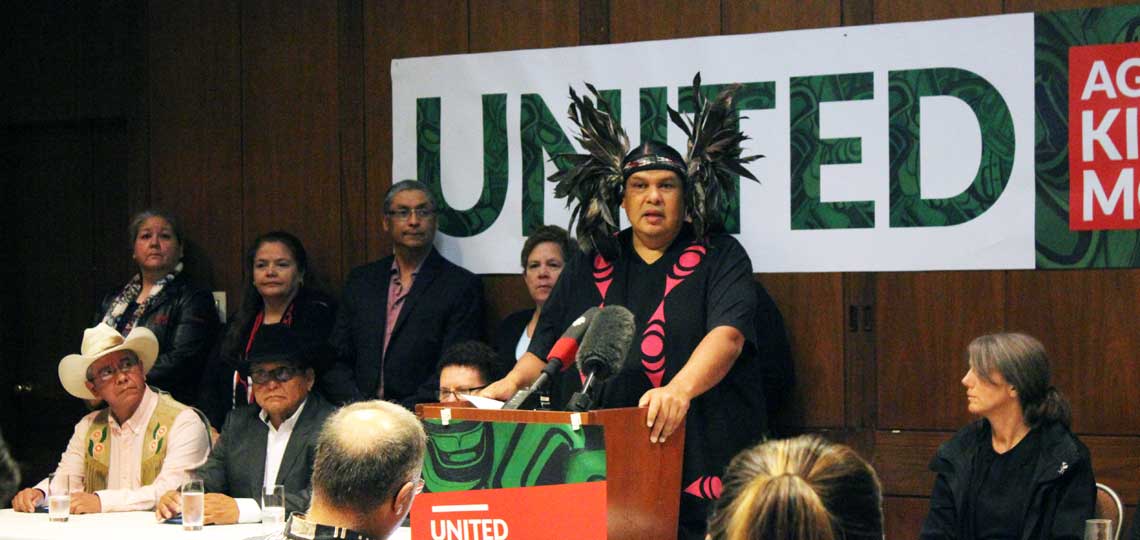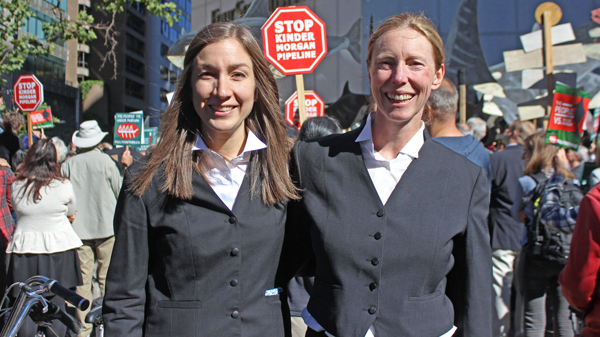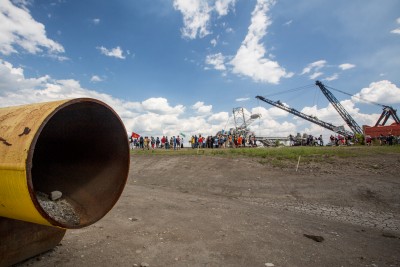Guided by leaders such as Tsleil-Waututh Sundance Chief Rueben George, Indigenous peoples and their allies are at the forefront of the fight against Kinder Morgan. Ecojustice Executive Director Devon Page reflects.
It has been six months since the historic hearing that saw six nations take their fight against Kinder Morgan to court. And as we await a ruling from the Federal Court of Appeal on the lawfulness of the federal government’s approval of the pipeline expansion, the situation on Burnaby Mountain is growing increasingly tense.
Ecojustice lawyers represented Raincoast Conservation Foundation and Living Oceans Society in the same hearing. We take the position that Kinder Morgan and the government, which are trying to force this project to proceed before the Court renders a judgment on whether the project is legitimate, are doing so at their peril.
Nonetheless, earlier this week, Kinder Morgan issued pipeline proponents and opposition an ultimatum: Reach an agreement by May 31 on how to push the pipeline through, or, Kinder Morgan chairman Steve Kean said, “it is difficult to conceive of any scenario in which we would proceed with the Project.”
Since then, there has been much political grandstanding. Prime Minister Justin Trudeau vowed “The Trans Mountain expansion will be built.” Alberta Premier Rachel Notley promised retaliation against B.C. and said she would consider funding the project with Alberta money. British Columbia Premier John Horgan stood by his government’s opposition to the project.
Meanwhile, those behind Kwekwecnewtxw – Protect the Inlet, an Indigenous-led initiative supported by allied organizations, called for “bold action” before the May 31 deadline.
As Grand Chief Stewart Phillip of the Union of B.C. Indian Chiefs told CBC, “In many ways I think this is the first time Kinder Morgan has appreciated the intensity and the reality of the broad-based and deeply entrenched opposition to the Kinder Morgan Trans Mountain pipeline project here in British Columbia.”
Today, as I reflect on how we got here — and what comes next — I find myself looking to Indigenous leaders at the forefront of resistance to Kinder Morgan, and to the principles of reconciliation that must guide the way forward.
The duty to consult
When the Tsleil-Waututh Nation, Squamish Nation, Coldwater Indian Band, Upper Nicola Band, Stk’emlupsemc Te Secwepemc and Sto:lo applicants appeared in court last October, they argued that the government failed to properly consult with their individual nations before approving the expansion.
It is an argument that has proven deadly to past projects.
In 2016, the Federal Court of Appeal ruled that the government had failed to properly consult First Nations affected by the Northern Gateway pipeline, effectively shutting the door on that project.
When it comes to Kinder Morgan’s current project, Our Sacred Trust, a Tsleil-Waututh Nation initiative aimed at stopping the expansion, says on its website, “Extracting oil from the ground and transporting it to market via pipelines is impossible without consulting First Nations whose lands are affected.”
“Having this project go forward would reopen the many wounds already suffered as a result of the Crown’s historic disregard for Aboriginal title and rights.”
Beyond the courts: The Indigenous-led resistance playing out on the ground
When Sundance Chief Rueben George echoes his mother’s calls to “warrior up” against Kinder Morgan, the crowd listens.
Physically, George towers above most of those around him. But it is his rich voice and the confidence with which he speaks that make him appear larger than life.
A member of the Tsleil-Waututh Nation, George is one of a number of Indigenous leaders who are driving resistance against the expansion project.
On March 10, George spoke passionately in front of thousands of people on Burnaby Mountain, following a march that took protesters past the gates of Kinder Morgan’s Burnaby Mountain facility under the theme of “Kwekwecnewtxw – Protect the Inlet.” According to the RCMP, about 200 people have since been arrested for acts of civil disobedience at the facility since then.
The Kwekwecnewtxw project is led by members of the Tsleil-Waututh communities and allies, but it is not officially backed by the Tsleil-Waututh Nation government or band council.
The reasons for opposing the project are numerous and varied. And they often seem to converge in the day-to-day reality of Indigenous peoples in the path of the project.
As Ecojustice lawyers have argued in court, the project poses unacceptable risks to endangered Southern Resident killer whales, a culturally-significant species, and to wild salmon, a key food source for both humans and the Southern Residents.
For the communities living near or downstream from Alberta’s oil sands, the ongoing expansion and industrialization in the area poses a major health threat. And on a global scale, this growth takes us in the wrong direction on climate change.
Looking to reconciliation for a path forward
In 2015, seven years after it was first launched, Canada’s Truth and Reconciliation Commission issued what the Toronto Star called its “final, horrific and damning report.”
Notably, the report calls on the federal, provincial, territorial and municipal governments to adopt and implement the United Nations Declaration on the Rights of Indigenous Peoples, and calls on the federal government to work with Indigenous organizations to establish Indigenous law institutes for the development, use and understanding of Indigenous laws.
It is clear that, going forward, we need to let principles of reconciliation guide how we achieve social and environmental justice, both inside and outside the courts.
Our friends at West Coast Environmental Law are already forging a path in this direction by “providing legal and strategic advice to Indigenous nations” through their Indigenous Law program, and working with Indigenous partners to create written summaries of their laws as part of the RELAW project, which is sponsored by the University of Victoria’s Indigenous Law Research Unit.
At Ecojustice, we are trying to heed George’s call to “warrior up” by exploring how we can better support Indigenous-led initiatives.
This past year, we struck a reconciliation working group at Ecojustice to help us explore our existing relationship to Indigenous peoples and laws in Canada, and ways to improve upon it.
This means you will see us more directly working with and representing Indigenous clients, or, as in the Kinder Morgan lawsuit, representing non-Indigenous clients and going to court in solidarity with Indigenous communities. But sometimes, like now, taking a backseat and making sure that other voices — like those of Sundance Chief Rueben George and Grand Chief Stewart Phillip — will take priority.
As we continue to gaze inward on our own practices and outward on how Indigenous peoples are leading resistance and reconciliation efforts, I look forward to sharing further updates and reflections with you.
Until then, in the spirit of prioritizing other voices, I recommend you check out these initiatives and resources led by Indigenous peoples and allies:



